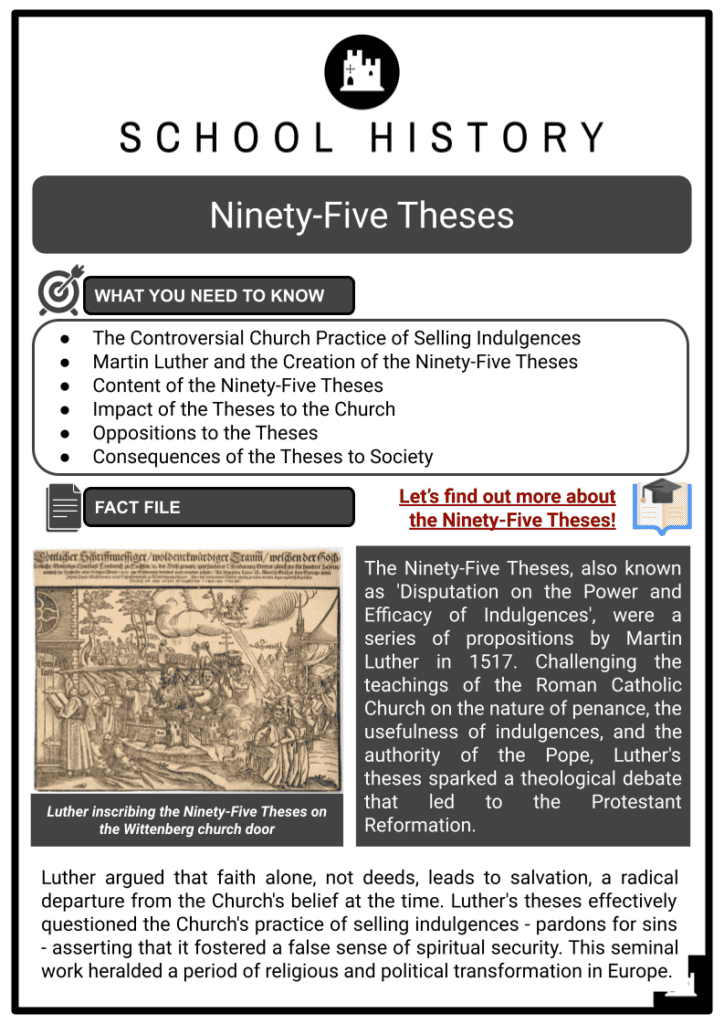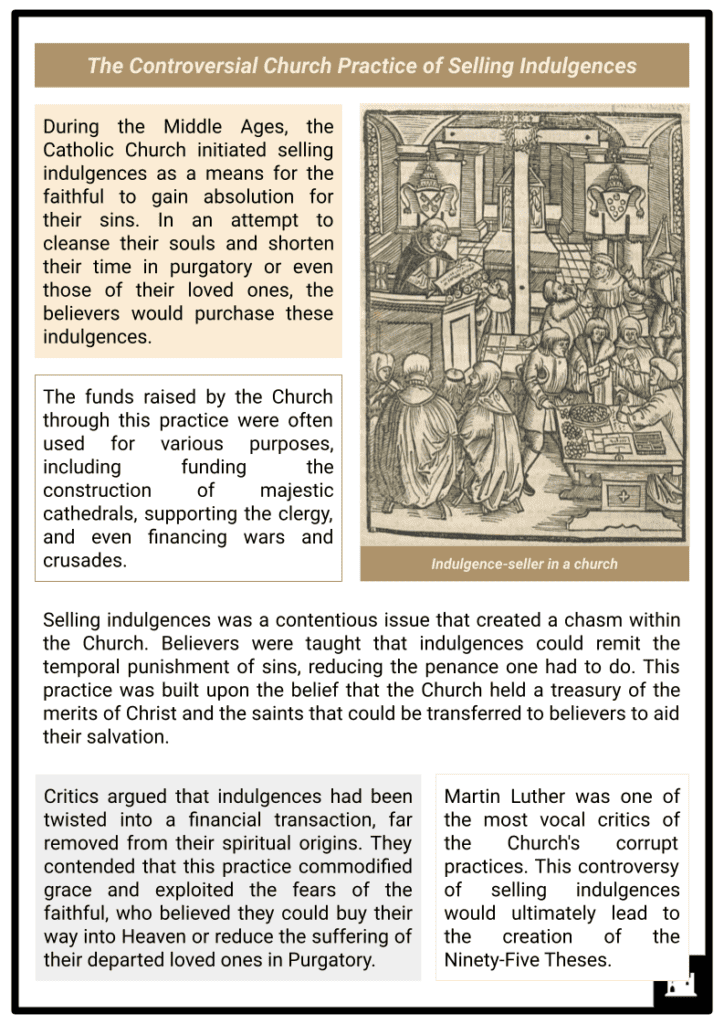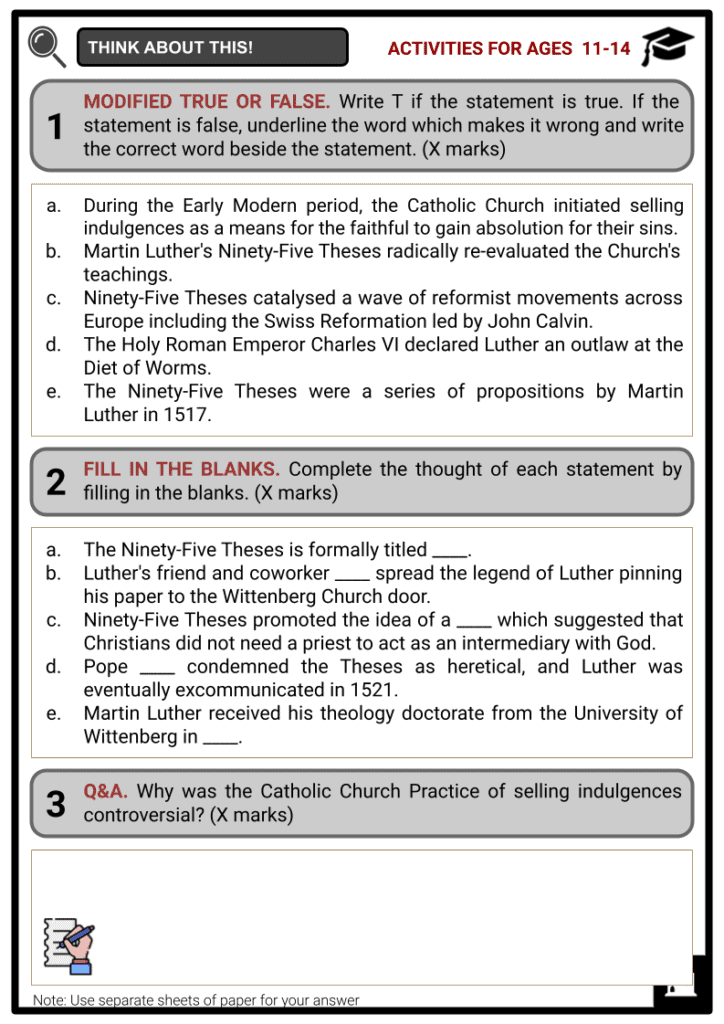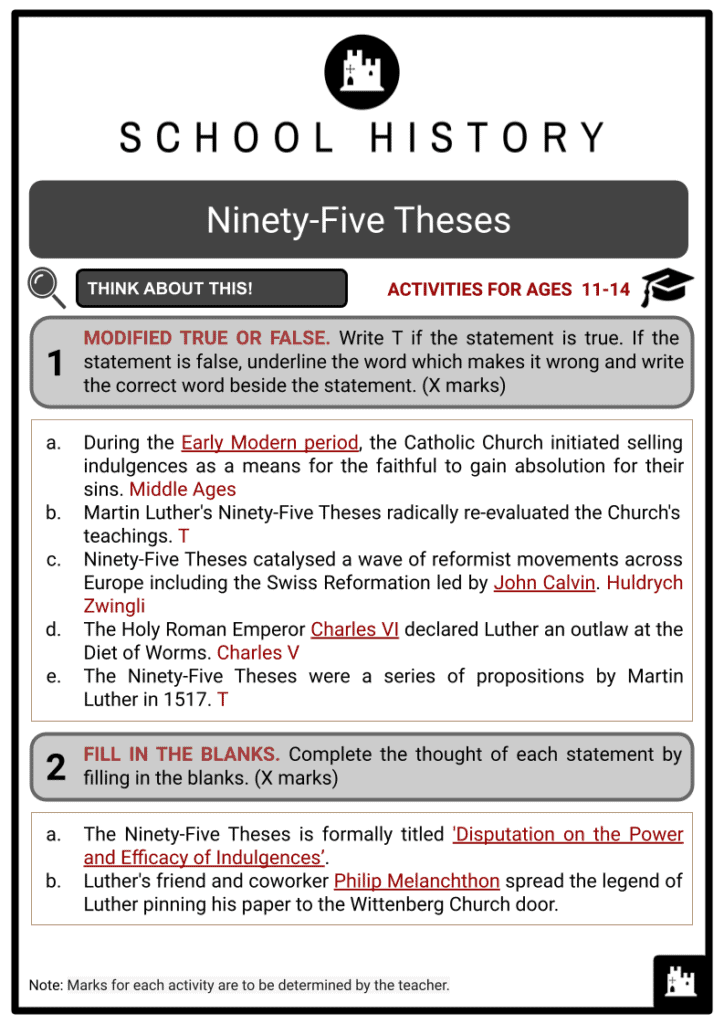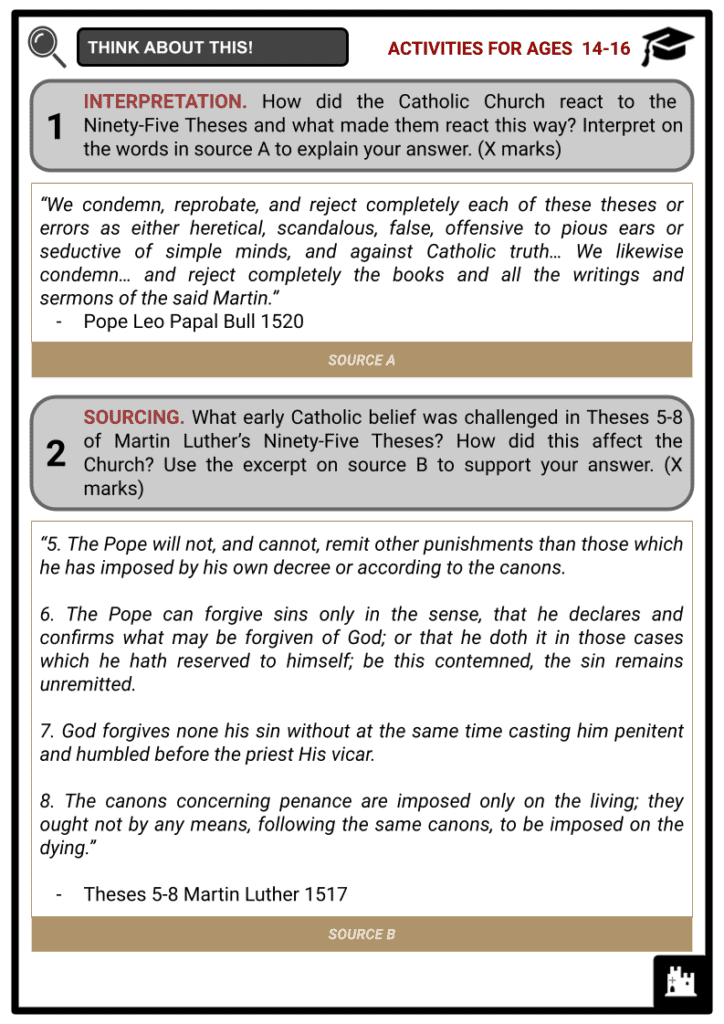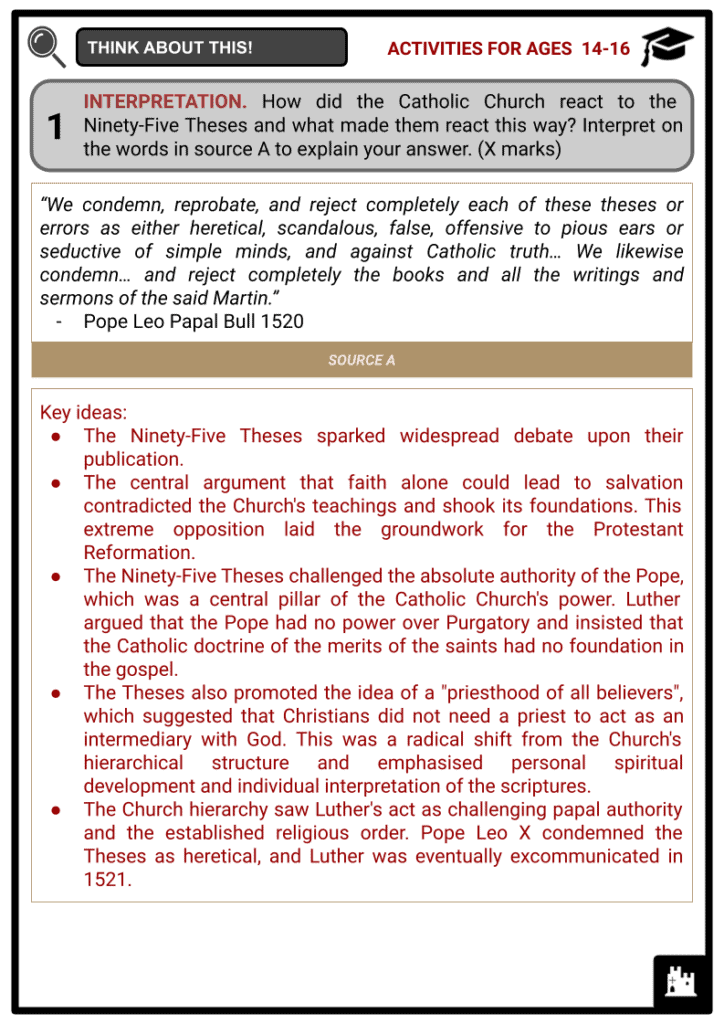Ninety-Five Theses Worksheets
Do you want to save dozens of hours in time? Get your evenings and weekends back? Be able to teach about Ninety-Five Theses to your students?
Our worksheet bundle includes a fact file and printable worksheets and student activities. Perfect for both the classroom and homeschooling!
Summary
- The Controversial Church Practice of Selling Indulgences
- Martin Luther and the Creation of the Ninety-Five Theses
- Content of the Ninety-Five Theses
- Impact of the Theses to the Church
- Oppositions to the Theses
- Consequences of the Theses to Society
Key Facts And Information
Let’s find out more about the Ninety-Five Theses!
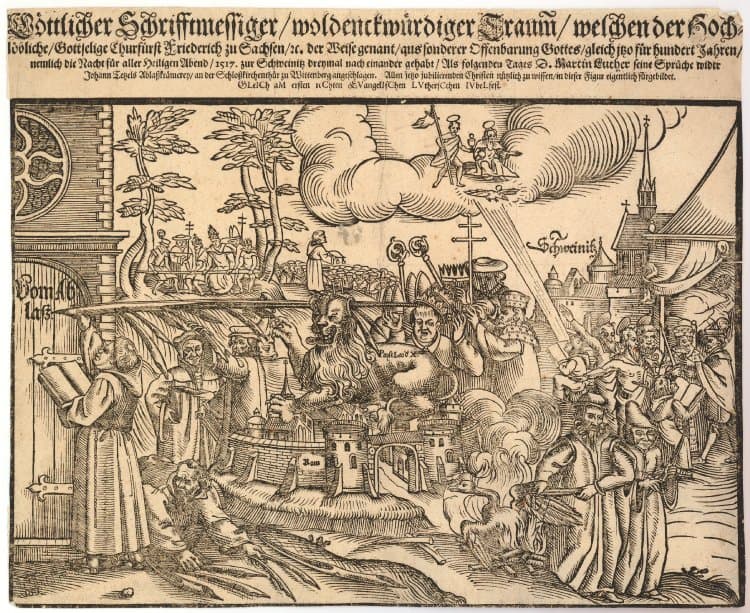
The Ninety-Five Theses, also known as 'Disputation on the Power and Efficacy of Indulgences', were a series of propositions by Martin Luther in 1517. Challenging the teachings of the Roman Catholic Church on the nature of penance, the usefulness of indulgences, and the authority of the Pope, Luther's theses sparked a theological debate that led to the Protestant Reformation. Luther argued that faith alone, not deeds, leads to salvation, a radical departure from the Church's belief at the time. Luther's theses effectively questioned the Church's practice of selling indulgences - pardons for sins - asserting that it fostered a false sense of spiritual security. This seminal work heralded a period of religious and political transformation in Europe.
The Controversial Church Practice of Selling Indulgences
- During the Middle Ages, the Catholic Church initiated selling indulgences as a means for the faithful to gain absolution for their sins. In an attempt to cleanse their souls and shorten their time in purgatory or even those of their loved ones, the believers would purchase these indulgences.
- The funds raised by the Church through this practice were often used for various purposes, including funding the construction of majestic cathedrals, supporting the clergy, and even financing wars and crusades.
- Selling indulgences was a contentious issue that created a chasm within the Church. Believers were taught that indulgences could remit the temporal punishment of sins, reducing the penance one had to do. This practice was built upon the belief that the Church held a treasury of the merits of Christ and the saints that could be transferred to believers to aid their salvation.
- Critics argued that indulgences had been twisted into a financial transaction, far removed from their spiritual origins. They contended that this practice commodified grace and exploited the fears of the faithful, who believed they could buy their way into Heaven or reduce the suffering of their departed loved ones in Purgatory.
- Martin Luther was one of the most vocal critics of the Church's corrupt practices. This controversy of selling indulgences would ultimately lead to the creation of the Ninety-Five Theses.
Martin Luther and the Creation of the Ninety-Five Theses
- Martin Luther, born in Eisleben, Saxony, 1483, was an influential figure of the Protestant Reformation. He was an accomplished scholar, receiving his theology doctorate from the University of Wittenberg in 1512. Serving as a professor at the same university, he became increasingly disturbed by the Catholic Church's practice of selling indulgences.
- As soon as Luther grasped the character of God as revealed in the Bible, he started to severely doubt the conception of God that the mediaeval Church had fostered. Luther reasoned that if salvation was based solely on one's faith, what use were all the Church's regulations, laws, and tithe requirements?
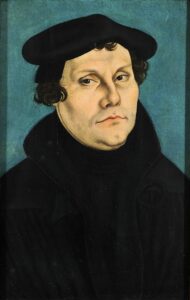
Martin Luther - The Church's doctrine of Purgatory, where sinners were tormented in flames until their sins were forgiven and allowed to join paradise, has no foundation in the Bible. Even so, where was the Pope's justification in Scripture?
- Martin Luther's deep-seated frustration with the Church's practices culminated in the creation of the Ninety-Five Theses, formally titled "Disputation on the Power of Indulgences". Tradition holds that Luther pinned his paper to the Wittenberg Church door on 31 October, All Saints Eve, 1517; however, contemporary study disputes this account.
- Later, Luther's friend and coworker Philip Melanchthon, who was not even at Wittenberg then, spread the legend of Luther and the church door. Nevertheless, academics agree that Luther would have been known for spectacular actions like nailing his arguments to the church door.
- Luther penned the Theses in Latin, intending to serve as talking points for a theological debate among academics. However, their translation into German and subsequent printing and dissemination led to widespread public discussion, reaching a much larger audience than Luther had initially intended.
- The Ninety-Five Theses was not just a scholarly treatise but a bold declaration challenging the corruption Luther perceived within the Church. Each of the ninety-five statements that composed this document was a direct critique of the Church's practice of selling indulgences, the idea that one could essentially buy their way to salvation.
Inside the Ninety-Five Theses
- Martin Luther's Ninety-Five Theses radically re-evaluated the Church's teachings. Its core principle declared that salvation could not be bought, but rather was a gift from God, received through faith.
- The Theses criticised the selling of indulgences and examined the Church's approach to sin and confession. Theses 5-8 challenged the belief that the Pope had the power to forgive sins, asserting instead that only God could do this. Luther argued that priests merely offer a sacramental sign of forgiveness, but God alone absolves individuals from their sins.
- Luther's Theses also emphasised the importance of inner repentance over external rituals. Theses 35-37 debunked the notion that an indulgence could make repentance unnecessary, prompting Christians to look beyond the superficial act of purchasing forgiveness to the more profound spiritual process of self-examination and contrition.
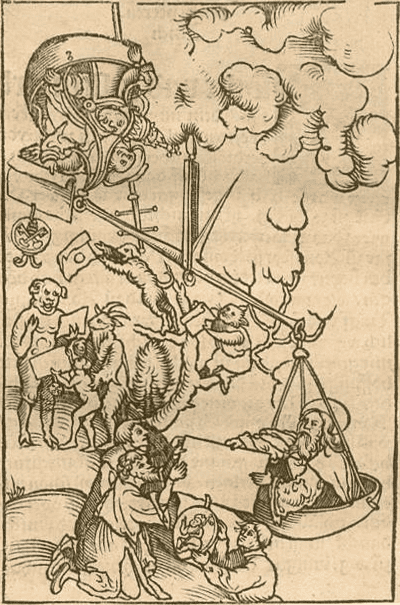
Depiction of Theses arguments - The theses critiqued the Church's commercialisation of salvation, with theses 45-51 directly criticising the practice of selling indulgences, stating, "Christians are to be taught that he who sees a needy man and passes him by, yet gives his money for indulgences, does not buy papal indulgences but God's wrath."
- In Theses 62-66, Luther challenged the Church's claim that salvation could be achieved through good works. He contended that faith alone was crucial for salvation, laying the groundwork for a central tenet of Protestant theology.
- Theses 92-95 held the concluding and resonant message, urging Christians to follow Christ, who entered paradise through a life of humility, self-denial, and faith.
- Luther's work was not merely a list of arguments, but a call to reform, to return to the teachings of Christ and the Bible, highlighting Scripture as the ultimate spiritual authority. This revolutionary document sparked a robust debate about the Church's practices, playing a pivotal role in shaping the Protestant Reformation.
Impact on the Church
- Martin Luther's Ninety-Five Theses sparked widespread debate upon their publication. His central argument that faith alone could lead to salvation contradicted the Church's teachings and shook its foundations. His extreme opposition led to his excommunication and laid the groundwork for the Protestant Reformation.
- Luther's teachings spread rapidly throughout Germany and other parts of Europe in the early 16th century as people began to read and discuss his ideas. Many people were attracted to Luther's emphasis on salvation through faith alone and his criticism of the sale of indulgences and other practices of the Roman Catholic Church, which led to the formation of new religious communities and the establishment of churches outside of the Catholic Church.
- The implications of Luther's Ninety-Five Theses were immense and multi-faceted. Notably, they challenged the absolute authority of the Pope, which was a central pillar of the Catholic Church's power. Luther argued that the Pope had no power over Purgatory and insisted that the Catholic doctrine of the merits of the saints had no foundation in the gospel.
- The Theses also promoted the idea of a "priesthood of all believers", which suggested that Christians did not need a priest to act as an intermediary with God. This was a radical shift from the Church's hierarchical structure and emphasised personal spiritual development and individual interpretation of the scriptures.
- Furthermore, the Ninety-Five Theses catalysed a wave of reformist movements across Europe. They sparked the Swiss Reformation led by Huldrych Zwingli, the Reformation in France spearheaded by John Calvin, and the English Reformation that eventually led to the establishment of the Church of England.
- As such, Luther's bold challenge against the Church's practices did not merely create a temporary ripple but instead instigated a tidal wave of religious, cultural, and societal transformations that are still felt today.
Oppositions to the Ninety-Five Theses
- Luther's Ninety-Five Theses faced significant opposition from various quarters. To begin with, the Catholic Church, unsurprisingly, represented the most vehement opposition. The Church hierarchy saw Luther's act as challenging papal authority and the established religious order. Pope Leo X condemned the Theses as heretical, and Luther was eventually excommunicated in 1521.
- Another source of opposition came from within the monarchy. Many rulers, especially those closely aligned with the Church, feared Luther's ideas would destabilise their kingdoms and incite social unrest. Notably, the Holy Roman Emperor Charles V declared Luther an outlaw at the Diet of Worms.
- Moreover, Luther also faced resistance from other reformers who did not agree with all of his teachings. This resulted in significant fracturing within the Protestant movement, leading to the development of different Protestant traditions. These oppositions, far from suppressing Luther's movement, further highlighted the Ninety-Five Theses' profound impact on Europe's religious landscape.
Consequences to Society
- The Ninety-Five Theses had profound societal implications, triggering changes far beyond religion. They ignited a spirit of critical inquiry and individualism among the people, encouraging them to question traditional authority and paving the way for the Enlightenment era.
- Education was prioritised as literacy became necessary to read and interpret the Bible, leading to a significant increase in literacy rates across Europe. The need for accessible copies of the Bible also spurred advancements in printing technology, delivering a significant boost to the publishing industry.
- Furthermore, the Theses bred a new wave of political thought. Luther's challenge to the papal authority unintentionally gave rise to the concept of separation of Church and state, a principle that remains a cornerstone of many modern democratic societies. Simultaneously, the shift in power dynamics led to the rise of nation-states, as monarchs and rulers seized the opportunity to consolidate their power, free from papal interference. This shift is considered a critical factor in the end of feudalism and the dawn of the modern era.
- Lastly, the social fabric was inherently transformed. The Theses led to the Protestant work ethic, a sociological theory that connects Protestantism with hard work, diligence, and frugality. This ethic profoundly influenced the development of capitalism, contributing to the economic transformation of Europe.
- The implications of Martin Luther's Ninety-Five Theses were not confined to religious reformations. The Theses left an indelible footprint on educational norms, political structure, economic theory, and social customs, making them a pivotal event in world history.
Image Sources
- https://upload.wikimedia.org/wikipedia/commons/7/7f/G%C3%B6ttlicher_Schrifftmessiger_print.jpg
- https://upload.wikimedia.org/wikipedia/commons/thumb/9/90/Lucas_Cranach_d.%C3%84._-_Martin_Luther%2C_1528_%28Veste_Coburg%29.jpg/800px-Lucas_Cranach_d.%C3%84._-_Martin_Luther%2C_1528_%28Veste_Coburg%29.jpg
- https://upload.wikimedia.org/wikipedia/commons/3/37/Forgiveness_from_Christ_outweighs_indulgences_from_the_Pope.png
Frequently Asked Questions
- What are the Ninety-Five Theses?
The Ninety-Five Theses are a list of arguments primarily questioning certain practices of the Roman Catholic Church, particularly the sale of indulgences.
- Who wrote the Ninety-Five Theses and why?
Martin Luther wrote the Ninety-Five Theses in 1517 to challenge the sale of indulgences by the Church. He believed this practice distorted true Christian teachings on salvation through faith in Jesus Christ. Luther posted the Theses on the church door in Wittenberg, intending to spark a theological debate, which led to the Protestant Reformation.
- What impact did the Ninety-Five Theses have?
The Ninety-Five Theses sparked a significant religious and cultural movement, the Protestant Reformation. Luther's critique of the Church's practices led to a broader challenge of its authority, resulting in the establishment of Protestant denominations and the division of Christianity.

